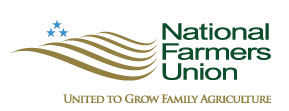From the National Farmers Union
National Farmers Union President Roger Johnson today discussed the role of family farming and cooperatives in food security and food sovereignty as part of a panel discussion at the International Summit of Cooperatives in Quebec City, Canada.
“Family farms and ranches worldwide are the cultural, social, economic, and security cornerstones of every nation,” said Johnson. “Forty percent of the world’s households directly depend on family farming, and every person who eats also depends on family farmers.”
The International Summit of Cooperatives, held annually, brought together nearly 200 leading experts and more than 2500 participants from 42 countries to share their knowledge on innovation in sustainability, development, employment, food security, and the economics of cooperatives.
Johnson noted that despite agricultural production in the United States shifting to large farms, trends also indicate an increase in new, yet smaller, farms.
“Americans want families to own and operate farms and ranches,” said Johnson. “Consumers want local foods, and demand is creating new opportunities.”
Johnson also noted that in the United States, farmers and ranchers have been successfully involved in cooperatives for nearly 100 years. Farmers Union’s own history is closely tied with the cooperative movement, having developed and supported thousands of cooperatives over the decades. “Cooperatives and agriculture go hand-in-hand,” said Johnson.
“Co-ops provide farmers and ranchers with lower-cost inputs, higher income through marketing and processing, financial resources, access to electrical utilities and communications technology, and connections to consumers.”
The five panelists also discussed the idea that family agriculture is the basis for sustainable production to move towards food security. Johnson pointed out the many benefits of food security in the United States.
“Food security has allowed the U.S. economy to expand into technology, manufacturing, entertainment and heavy industry,” said Johnson. “Consumers spend less than 10 percent of their income on food and it also allows the U.S. to have programs to help feed the poor.”






